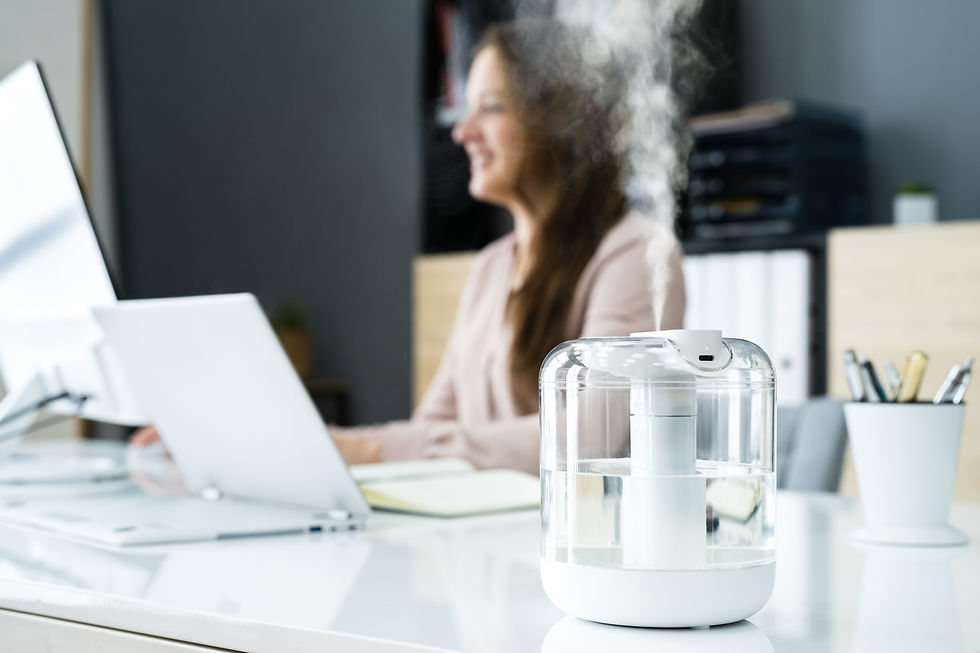Humidifiers: Should I Use One?
- Victoria Wermers, RN,MSN,FNP, PMHNP
- Dec 21, 2024
- 4 min read
Updated: Jul 6, 2025
Many patients ask if they should use a humidifier when they have a respiratory condition. The answer is...maybe. Humidifiers can be beneficial to use even when you are well, especially in the winter when the temperature goes up and the humidity goes way down. The air can become very dry, which can cause several health problems. In fact, viruses tend to remain more transmissible in drier air.
Herein lies the problem: If a person uses a humidifier, they must care for it exactly as directed: This can take a lot of work. Use the recommended type of water and clean according to directions. Otherwise, it can do more harm than good.

Should I Use a Humidifier? Common Conditions That May Benefit from Use of a Humidifier
Dry skin
Dry eye
Irritated eyes
Dry mouth, throat, or airways
Sore throat
Allergies
Frequent coughs
Bloody noses
Cracked lips
Cold and sinus - may help liquefy mucus so that a person can cough it up or blown out more easily
Dry mucus
Reduces snoring/improves sleep
In addition, humidifiers are often cited as a means to prevent flu - by killing viruses (see below)
Types of Humidifiers: Which One to Use
There are several kinds of humidifiers, all of which have the same essential function but operate a bit differently:
Steam vaporizers use heat to vaporize water. The heat in a humidifier is good because it helps kill bacteria, mold, and fungus in the water. The most significant problem with these is that they can burn a person, especially a child, if they spill hot water.
Ultrasonic humidifiers - Vibrations work to turn water into a fine mist. They can come in cool or warm settings. They are usually fairly quiet and can cause the air to feel a bit cooler than usual. These must be kept clean, otherwise there is a higher risks of spreading bacteria, mold, and minerals from water contamination as they spray mist into the air; These are typically more expensive.
Warm mist humidifiers kill bacteria and other microbes in boiling water so those microbes typically will not enter the air. But again, because of the heat, they are a burn risk for children (and pets).
Evaporators—These humidifiers typically involve a wick that draws up water and a fan that blows on it, creating vapor. They use cool water and are suitable for large rooms; however, controlling humidity can be challenging. They are usually lower in price than some of the others. The disadvantage is that the cool water can foster mold, bacterial growth, and mineral deposition if not cleaned and maintained correctly. They also require a filter and wick replacement.
Impeller humidifiers—These use a rapidly spinning disk to spray cool water into a diffuser. Most of these cover a large space. An air washer, a type of impeller, not only humidifies but also cleans the air of allergens and dust, making it suitable for people with allergies. They are usually a bit expensive and can be noisy.
Central humidifiers—These are attached to a central air conditioning unit. They are easy to maintain and humidify the entire house. However, they can be relatively expensive, costing anywhere from $150.00 to over $1000, depending on the type you get.
Maintaining a Humidification System
It is imperative to note that if cool water humidifiers are not used and maintained properly, bacteria, mold, and fungi can grow in the water and be dispersed in the air, actually making someone sick or causing them to get worse. In addition, if the proper water and filters are not used, the machine can disperse minerals into the air, which a person can potentially inhale. So, proper maintenance is essential, no matter which type of equipment you use.
The second very important detail you need to pay attention to is the amount of humidity you choose to disperse in the air. Ideally, the humidifier should be operating at about 40-60% - that is, if you have a dial (which you want when choosing a humidifier), the latter should be set at a midpoint or medium. At this point, you will help maintain hydration of the skin and mucus membranes AND kill viruses in the air. A lower setting will not do the job. A higher setting may foster the growth of dust mites and mold and contribute to rot.
Third, using distilled water to avoid mineral accumulation in the machine is idea (unless otherwise indicated). Clean the machine exactly as directed and change the water daily. If you are not going to use the humidifier correctly, it is probably best not to use it at all. Many of these require a LOT of work to maintain.
Lastly, if you use one of the portable humidifiers above, it should be at least three to five feet away from a person. If too close, it can create too much local humidity, and, if warm, can potentially cause burns if spilled. Too much humidity can seriously worsen respiratory conditions.
Humidifiers: Q&A
Are diffusers the same as humidifiers?
While diffusers add a little humidity to a room, most do not add enough to be considered humidifiers. However, some humidifiers diffuse oils as well. If you like essential oils, this might be a great choice. Many of these humidifiers provide humidity to only a small space, but a few others can humidify/diffuse oil in two rooms.
Can I put essential oils in my humidifier?
Using oils in a humidifier is not a good idea unless it is explicitly made to diffuse oils. Most humidifiers are not made to hold oils. Oils can damage them degrading the plastic and causing it to crack and malfunction.
If you are more interested in the importance of humidity for health, there is a lot more information about it online at NIH.



